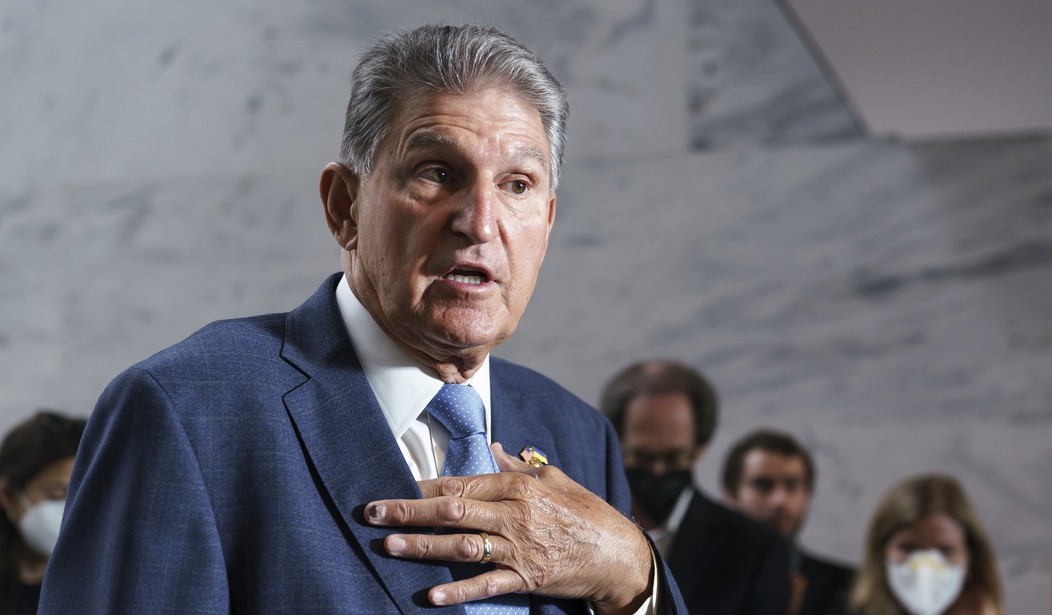To paraphrase an old saying, there are polls, damned polls, and hypothetical click-bait. To which category should we assign a Quinnipiac poll that reports 47% of American voters willing to consider a third-party presidential candidate in 2024? Especially when nearly as many voters of a specific party affiliation indicate openness to the idea?
Door Number 3, perhaps, but even so, this can’t help but make Joe Manchin feel tingly all over (via PJ Media):
With the 2024 presidential race potentially pitting a current and former president against each other and more than a dozen other candidates officially seeking their party’s presidential nomination, voters are evenly split about voting for a third-party candidate, with 47 percent saying they would consider voting for a third-party candidate in the 2024 presidential election and 47 percent say they would not consider it, according to a Quinnipiac (KWIN-uh-pe-ack) University national poll released today.
Independents say more than 2 to 1 (64 – 30 percent) that they would consider voting for a third-party candidate in the 2024 presidential election while Democrats (61 – 35 percent) and Republicans (57 – 38 percent) say they would not consider it.
Gee, I wonder why this idea might get this much interest from voters? Perhaps it has something to do with the fact that voters already had to choose between the two likely nominees before and aren’t fans of re-runs. Or it could be that one of the options is currently racking up criminal indictments and the other looks like he needs a minder and translator every time he’s out in public. It might just be frustration over the idea that the two major political parties couldn’t do better than these choices in 2020 and still can’t do better in 2024.
Undoubtedly, the abysmal levels of personal popularity for both Joe Biden and Donald Trump have something to do with it. Trump scores a 38/57 favorability rating, while Biden is only incrementally better at 40/54. Neither leading candidate is “knocking it out of the park on favorability,” Quinnipiac analyst Tim Malloy says while employing the gentle art of understatement. Neither candidate at the moment even unites his own party, and both of them appear to repel well over half of independents.
This points up a real problem for both parties as 2024 approaches. Assuming that the rematch occurs, about the only enthusiasm in the race will be attributable to opposition rather than true and broad enthusiastic support. Democrats will turn out to deny Trump another term, and those Republicans who don’t like Trump will perhaps more grudgingly turn out to end the Biden presidency … or perhaps the Kamala Harris presidency. Independents will largely check out, although on favorability they lean slightly more in Trump’s direction (37/55 compared to 32/61 for Biden). However, this would also largely be a rerun of the dynamic in 2020 too, and Biden ended up benefiting more from it — and that was before the Stop the Steal/January 6 events took place. The midterms also provided a pretty good picture of how the American electorate will split in terms of a Biden v Trump rematch, thanks to its clear proxy in winnable Senate races last year that the GOP lost.
In that environment, a third-party choice would look pretty attractive — in theory.
The problem with that is that elections aren’t run on archetypes. Third-party bids always look attractive in theory, which is the real flaw in such polls that use them. To ask the question is to beg the answer, especially this far out and with no candidate to compare against the two presumed frontrunners for the nomination. It’s like adding a “none of the above” option to political polls — asking the question is designed to get the answer.
Does that mean that Americans won’t choose a third party option, assuming one becomes available? Some will, but it won’t amount to 47% or probably even a tenth of that. The last serious bid for a third-party presidency came from Ross Perot, who got 19% of the popular vote and won precisely zero states despite a lot of money and time spent on building the Reform Party organization in 1992. Perot was a true outsider to the partisan system as well, not a retread Democrat or Republican politico. Perot poured a lot of his own money into the race and did extensive campaigning on pertinent issues, but still couldn’t convince enough voters to break out of the major-party paradigm to even get a single Electoral College elector.
Granted, Bill Clinton and George H.W. Bush were likely more respected at that point than Biden and Trump are now. That’s what is driving the result of this clickbaity polling question, but it’s a useless query without an actual third party in place that has the resources to compete, let alone an actual candidate to cite. If Quinnipiac polls on a three way race that specifically includes Joe Manchin and he gets 47% of the respondents’ support, then we can take this somewhat seriously. Otherwise, it’s basically a polling query that asks voters to choose Biden, Trump, or none of the above. In this case especially, is anyone surprised that NOTA is a popular choice?
Still, the fact that nearly forty percent of registered Republicans and Democrats are willing to look outside their party for a president should have leaders in both parties very worried about their own future. And perhaps it should have voters in both parties reconsidering their own apparent frontrunners as well.
Update: Via Steve Eggleston, Perot got 19%, not 29%. My apologies; I’ve fixed it above.








Join the conversation as a VIP Member